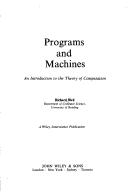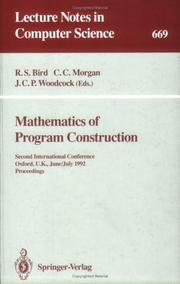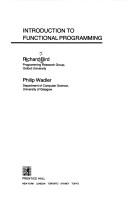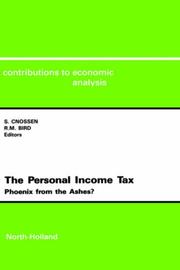| Listing 1 - 10 of 17 | << page >> |
Sort by
|

ISBN: 0471016500 Year: 1976 Publisher: London Wiley
Abstract | Keywords | Export | Availability | Bookmark
 Loading...
Loading...Choose an application
- Reference Manager
- EndNote
- RefWorks (Direct export to RefWorks)
Computer science --- Computer programming --- #TCPW P3.0 --- 681.3*F1 --- 681.3*F2 --- 681.3*F3 --- 681.3*F41 --- Computers --- Electronic computer programming --- Electronic data processing --- Electronic digital computers --- Programming (Electronic computers) --- Coding theory --- Computation by abstract devices --- Analysis of algorithms and problem complexity--See also {681.3*B6}; {681.3*B7}; {681.3*F13} --- Logics and meanings of programs (Theory of computation) --- Mathematical logic: computability theory; computational logic; lambda calculus; logic programming; mechanical theorem proving; model theory; proof theory;recursive function theory--See also {681.3*F11}; {681.3*I22}; {681.3*I23} --- Programming --- Computer programming. --- 681.3*F41 Mathematical logic: computability theory; computational logic; lambda calculus; logic programming; mechanical theorem proving; model theory; proof theory;recursive function theory--See also {681.3*F11}; {681.3*I22}; {681.3*I23} --- 681.3*F3 Logics and meanings of programs (Theory of computation) --- 681.3*F2 Analysis of algorithms and problem complexity--See also {681.3*B6}; {681.3*B7}; {681.3*F13} --- 681.3*F1 Computation by abstract devices --- Informatique
Book
ISBN: 1316191826 1316189988 1316092410 Year: 2015 Publisher: Cambridge : Cambridge University Press,
Abstract | Keywords | Export | Availability | Bookmark
 Loading...
Loading...Choose an application
- Reference Manager
- EndNote
- RefWorks (Direct export to RefWorks)
Richard Bird is famed for the clarity and rigour of his writing. His new textbook, which introduces functional programming to students, emphasises fundamental techniques for reasoning mathematically about functional programs. By studying the underlying equational laws, the book enables students to apply calculational reasoning to their programs, both to understand their properties and to make them more efficient. The book has been designed to fit a first- or second-year undergraduate course and is a thorough overhaul and replacement of his earlier textbooks. It features case studies in Sudoku and pretty-printing, and over 100 carefully selected exercises with solutions. This engaging text will be welcomed by students and teachers alike.
Book
ISBN: 0801842654 0801842239 Year: 1992 Publisher: Baltimore, Md Johns Hopkins University Press
Abstract | Keywords | Export | Availability | Bookmark
 Loading...
Loading...Choose an application
- Reference Manager
- EndNote
- RefWorks (Direct export to RefWorks)
Tax law --- Economic policy and planning (general) --- Third World: economic development problems --- LDC / Developping Countries - Pays En Développement --- 336.61 --- 336.201 --- 336.401 --- Financieel beleid. --- Fiscaal regime: structuur en evolutie. Fiscale hervorming. --- Verband tussen begrotingspolitiek en economische evolutie. --- Fiscal policy --- Tax administration and procedure --- Taxation --- Tax practice --- Tax procedure --- Fiscaal regime: structuur en evolutie. Fiscale hervorming --- Verband tussen begrotingspolitiek en economische evolutie --- Financieel beleid --- Developing countries: economic development problems --- ECONOMIE DU DEVELOPPEMENT --- FINANCES PUBLIQUES --- POLITIQUE FISCALE

ISBN: 3540566252 0387566252 354047613X Year: 1993 Volume: vol 669 Publisher: Berlin New York Springer-Verlag
Abstract | Keywords | Export | Availability | Bookmark
 Loading...
Loading...Choose an application
- Reference Manager
- EndNote
- RefWorks (Direct export to RefWorks)
Not very long ago, the uninhibited use of mathematics in the development of software was regarded as something for academics alone. Today, there is moreand more interest from industry in formal methods based on mathematics. This interest has come from the success of a number of experiments on real industrial applications. Thus, there is not only a belief, but also evidence, that the study of computer programs as mathematical objects leads to more efficient methods for constructing them. The papers in this volume were presented at the Second International Conference on the Mathematics of Program Construction, held at St. Catherine's College, Oxford, June 29 - July 3, 1992. The conference was organized by the Oxford University Programming Research Group, and continued the theme set by the first - the use of crisp, clear mathematics in the discovery and design of algorithms. The second conference gives evidence of the ever-widening impact of precise mathematical methods in program development. There are papers applying mathematics not only to sequential programs but also to parallel and on-current applications, real-time and reactive systems, and to designs realised directly in hardware. The volume includes 5 invited papers and 19 contributed papers.
Electronic digital computers --- Programming --- Congresses --- Computer science --- Mathematics --- Electronic digital computers - Programming - Congresses. --- Computer science - Mathematics - Congresses. --- Software engineering. --- Information theory. --- Mathematics. --- Computer science. --- Computer software. --- Software Engineering/Programming and Operating Systems. --- Theory of Computation. --- Applications of Mathematics. --- Programming Techniques. --- Software Engineering. --- Algorithm Analysis and Problem Complexity. --- Software, Computer --- Computer systems --- Informatics --- Science --- Math --- Communication theory --- Communication --- Cybernetics --- Computer software engineering --- Engineering
Book
ISBN: 9780521513388 9780511763199 9780511902024 0511902026 9780511798870 0511798873 0511763190 0521513383 1139234781 1107206049 128274920X 9786612749209 0511901232 0511797478 0511900449 Year: 2012 Publisher: Cambridge: Cambridge university press,
Abstract | Keywords | Export | Availability | Bookmark
 Loading...
Loading...Choose an application
- Reference Manager
- EndNote
- RefWorks (Direct export to RefWorks)
Richard Bird takes a radical approach to algorithm design, namely, design by calculation. These 30 short chapters each deal with a particular programming problem drawn from sources as diverse as games and puzzles, intriguing combinatorial tasks, and more familiar areas such as data compression and string matching. Each pearl starts with the statement of the problem expressed using the functional programming language Haskell, a powerful yet succinct language for capturing algorithmic ideas clearly and simply. The novel aspect of the book is that each solution is calculated from an initial formulation of the problem in Haskell by appealing to the laws of functional programming. Pearls of Functional Algorithm Design will appeal to the aspiring functional programmer, students and teachers interested in the principles of algorithm design, and anyone seeking to master the techniques of reasoning about programs in an equational style.
Book
Year: 1998 Publisher: London : Prentice Hall Europe,
Abstract | Keywords | Export | Availability | Bookmark
 Loading...
Loading...Choose an application
- Reference Manager
- EndNote
- RefWorks (Direct export to RefWorks)
Book
ISBN: 1108858260 1108869041 Year: 2020 Publisher: Cambridge : Cambridge University Press,
Abstract | Keywords | Export | Availability | Bookmark
 Loading...
Loading...Choose an application
- Reference Manager
- EndNote
- RefWorks (Direct export to RefWorks)
This book is devoted to five main principles of algorithm design: divide and conquer, greedy algorithms, thinning, dynamic programming, and exhaustive search. These principles are presented using Haskell, a purely functional language, leading to simpler explanations and shorter programs than would be obtained with imperative languages. Carefully selected examples, both new and standard, reveal the commonalities and highlight the differences between algorithms. The algorithm developments use equational reasoning where applicable, clarifying the applicability conditions and correctness arguments. Every chapter concludes with exercises (nearly 300 in total), each with complete answers, allowing the reader to consolidate their understanding and apply the techniques to a range of problems. The book serves students (both undergraduate and postgraduate), researchers, teachers, and professionals who want to know more about what goes into a good algorithm and how such algorithms can be expressed in purely functional terms.
Book
Year: 1974
Abstract | Keywords | Export | Availability | Bookmark
 Loading...
Loading...Choose an application
- Reference Manager
- EndNote
- RefWorks (Direct export to RefWorks)

ISBN: 0134841891 0134841972 9780134841977 9780134841892 Year: 1988 Publisher: Englewood Cliffs (N.J.): Prentice Hall,
Abstract | Keywords | Export | Availability | Bookmark
 Loading...
Loading...Choose an application
- Reference Manager
- EndNote
- RefWorks (Direct export to RefWorks)
Programming --- Functional programming (Computer science) --- 681.3*D11 --- Computer programming --- Applicative (functional) programming --- Functional programming (Computer science). --- 681.3*D11 Applicative (functional) programming --- Functional programming --- Functional programming (computer science)

ISBN: 044488288X 9780444882882 Year: 1990 Volume: 191 Publisher: Amsterdam: North-Holland,
Abstract | Keywords | Export | Availability | Bookmark
 Loading...
Loading...Choose an application
- Reference Manager
- EndNote
- RefWorks (Direct export to RefWorks)
Tax law --- Income tax --- Impôt sur le revenu --- Congresses --- Congrès --- 336.215.21 --- 336.213 --- -impot sur le revenu --- congres --- AA / International- internationaal --- 336.212.0 --- 336.212.1 --- 336.200 --- 336.201 --- Papers presented at a conference held in Rotterdam in January 1989. --- NBB congres --- Personal income tax --- Taxable income --- Taxation of income --- Direct taxation --- Internal revenue --- Progressive taxation --- Tithes --- Wages --- Negatieve belastingsinkomsten --- Personele belasting --- inkomstenbelasting --- congressen --- Belasting op de inkomsten: algemeenheden. --- Belastingen op de bedrijfsinkomsten --- Belastingstelsel: algemene naslagwerken en principes. --- Fiscaal regime: structuur en evolutie. Fiscale hervorming. --- Taxation --- Congresses. --- 336.213 Personele belasting --- 336.215.21 Negatieve belastingsinkomsten --- Impôt sur le revenu --- Congrès --- impot sur le revenu --- Papers presented at a conference held in Rotterdam in January 1989 --- Belastingstelsel: algemene naslagwerken en principes --- Fiscaal regime: structuur en evolutie. Fiscale hervorming --- Belasting op de inkomsten: algemeenheden --- Droit fiscal --- Income tax - Congresses
| Listing 1 - 10 of 17 | << page >> |
Sort by
|

 Search
Search Feedback
Feedback About UniCat
About UniCat  Help
Help News
News